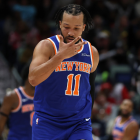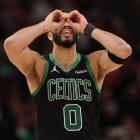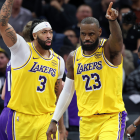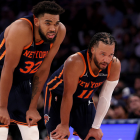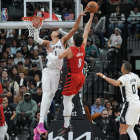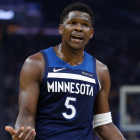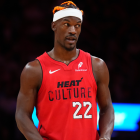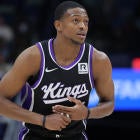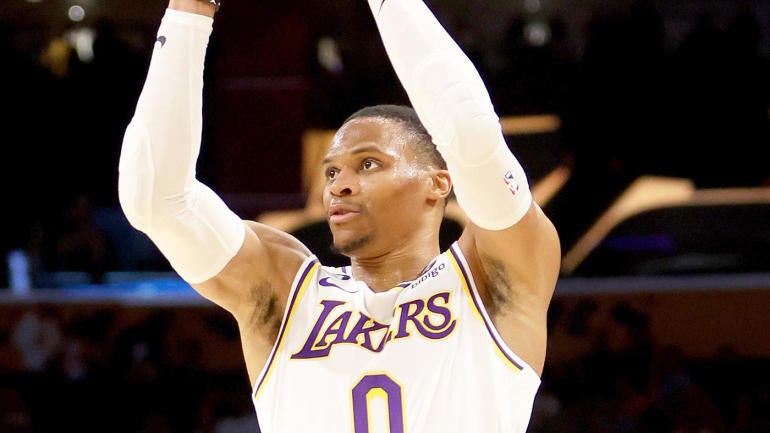
With 4:42 remaining in Sunday's game between the Los Angeles Lakers and the Portland Trail Blazers, LeBron James made a driving layup and got fouled in the process. The two points put Los Angeles up by seven, and with a free throw still to come, that lead would swell to eight. Before James shot that free throw, though, Russell Westbrook re-entered the game off the bench. Aside from the impending free throw, the Lakers would score just six total points for the rest of the game. Portland scored 16 to secure the victory.
There's an obvious correlation here. The Lakers were winning when Westbrook was out of the game. They lost the lead when he returned. To understand the causation, we need to look at the tape. Westbrook had his moments down the stretch. A pretty assist to Anthony Davis created two of the six points the Lakers scored in crunch time, for example. But Westbrook's greatest weakness is what ultimately doomed the Lakers down the stretch. He can't shoot, and the Blazers knew it.
That's why they took the unconventional step of defending Westbrook, a point guard, with Jusuf Nurkic, a center. That tactic, a rarity for most NBA guards, has become a staple Westbrook counter since he played with James Harden in Houston. Westbrook is such a non-threat from outside of the paint that the opposing center can effectively act as a spare rim protector rather than pretending to care if Westbrook tries a jumper. Take a look at how far off of Westbrook Nurkic plays on this possession, both when he has the ball and when he doesn't.
No Laker comes close to the basket on this possession because, for its first 20 or so seconds, Nurkic is free to provide an extra body at the rim should any Blazer defenders need the help. By the time he's switched onto Davis, Patrick Beverley doesn't have enough time left to create a better shot, so he hoists up an ugly 3-pointer. Clank.
Two players felt that lack of space more than the others. For three years, the James-Davis pick-and-roll has been this team's finishing move. Surround it with enough shooting and there's no obvious answer for it. Blitz and James passes into a 4-on-3. Drop and one of them gets a head of steam going downhill. Switch and Davis abuses a mismatch. Fight through the screen and lose a footrace to the basket. James is one of the greatest passers in NBA history. Davis has by far the league's widest catch radius. The two of them are a lob waiting to happen. That play won them a championship.
It turns out, defending it 3-on-2 is a fairly effectively solution. James and Davis tried to set up their two-man dance twice down the stretch, but the lurking Nurkic scared them out of it on both occasions. The first led to a Westbrook miss from 3-point range ...
And the second was a James brick from deep.
There is not a great shooter on the Lakers roster. James and Davis don't need great. The shooters on the 2020 roster weren't great. They were good enough. Most of the current rotation at least warrants cursory defensive attention from deep in a regular-season setting. Westbrook doesn't, and it defangs the most dangerous duo the Lakers have to offer.
As damaging as Westbrook's presence was off of the ball on Sunday, we also have to address what he did when he had it. Specifically, with roughly 30 seconds to play and the Lakers leading 102-101, Westbrook jacked up an ill-advised mid-range jumper that missed and gave the Blazers the ball back.
There is a theoretical strategic justification for this shot. Westbrook himself said he was going for a two-for-one. Mathematically speaking, two bad shots are more valuable than one good one. Westbrook made 38.3 percent of his mid-range attempts last season. If we assume both shots the Lakers would expect to get in this scenario would fall at roughly that rate, they'd statistically expect to score around 1.53 points across the two possessions. No shot outside of layups or free throws are going to yield such a high figure. A two-for-one was therefore technically the mathematically optimal path if the goal was to maximize total points in the final 30 seconds.
Of course, this ignores the actual game situation. The game wasn't tied. The Lakers were winning. Up by one point and with more than 24 seconds remaining, the Lakers knew that Portland was going to have the ball at least one more time. The goal, therefore, becomes finding the best possible shot, as a 2-pointer effectively guarantees at least overtime and a 3 would have likely clinched the victory.
Understanding how to navigate situational basketball is an essential point guard skill. According to ESPN's Kirk Goldsberry, Westbrook is the only player in the last four seasons to attempt a jump shot with under 30 seconds to go in a game with more than 15 seconds left on the shot clock while up by one possession. Even Darvin Ham, Westbrook's greatest public defender, acknowledged that he wished Westbrook would have attacked the basket rather than settled for the jumper.
Ham's critique is notable as he is the one deciding how much Westbrook plays. He's averaged roughly 29 minutes across three games thus far this season, all starts. But on Sunday, Westbrook was the only Laker starter with a negative point-differential (minus-4). The four other Laker starters combined to shoot just under 53 percent from the field. Westbrook's 4-of-15 outing put him at 26.7 percent. For the season, he has made only three of his 17 jumpers, according to Goldsberry. Last season's Lakers lost Westbrook's fourth-quarter minutes by five points per 100 possessions. They won the fourth-quarter minutes he sat out by over 11 points per 100 possessions. His defense, outside of a notable stretch against the Clippers on Thursday, has been unspectacular as ever.
All of this combines to paint a clear picture: The Los Angeles Lakers are a better basketball team when Russell Westbrook isn't on the floor. This is especially true in the sort of high-leverage situations that most glaringly magnify his weaknesses. The Lakers have now blown two winnable games in a row. Westbrook has combined to shoot 4 of 26 from the field in those two games. He's contributed to countless misses from his teammates. His presence cost the Lakers a win on Sunday. It may cost the Lakers their season if his role isn't substantially reduced in the very near future.










